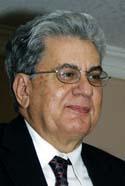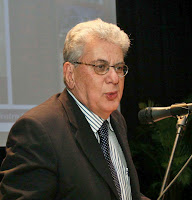JEFFREY MARK GOLDBERG - Fidel Castro: 'Oswald Could Not Have Been the One Who Killed Kennedy'
THE ATLANTIC
Jeffrey Mark Goldberg (born September 1965) is an American journalist. He is an author and a staff writer for The Atlantic, having previously worked for The New Yorker. Goldberg writes principally on foreign affairs, with a focus on the Middle East and Africa. Michael Massing, an editor of the Columbia Journalism Review, called Goldberg "the most influential journalist/blogger on matters related to Israel"
 |
| According to Castro, Cuban officials recreated the circumstances of Kennedy's shooting after the assassination. "It wasn't possible for one man to do," he says. (Claudia Daut/Reuters) |
Fidel Castro shares at
least one belief with the majority of Americans: He is convinced that the
assassination of President John F. Kennedy was not the work of a lone gunman,
but was the culmination of a broad conspiracy. According to a recent Gallup
poll, 61 percent of Americans believe Lee Harvey Oswald did not act
alone in Dallas 50 years ago. But Castro suspects that Oswald might not have
been involved in the assassination at all. Here is what he told me–to my great
surprise–over lunch one day in Havana: “I have reached the conclusion that
Oswald could not have been the one who killed Kennedy.” Castro is of course a
confident man, but he said this with a degree of surety that was noteworthy.
I was visiting Havana three
years ago at Castro’s invitation. I had just written a cover
story for The Atlantic about
Israel’s threat to strike militarily at Iran’s nuclear facilities. Castro read the
article, and sent me a message through the Cuban Interest Section in
Washington: He would like me to come to Cuba as soon as possible in order to
discuss my findings with him. I obliged.
Kennedy
was only a peripheral subject of our discussions. Castro, I found, was
preoccupied with the threat of nuclear war and proliferation, as one would
expect him to be: He was one of the three key players in an episode, the Cuban
missile crisis of 1962, that nearly brought about the destruction of the
planet. John F. Kennedy was his adversary; Nikita Khrushchev, the Soviet
premier, was his patron. At one point, I mentioned to him the letter he wrote
to Khrushchev, at the height of the crisis, in which he asked the Soviets to
consider launching a nuclear strike against the U.S. if the Americans attacked
Cuba. "That would be the time to think about liquidating such a danger
forever through a legal right of self-defense," he wrote. In Havana, I
asked him, “At a certain point it seemed logical for you to recommend
that the Soviets bomb the U.S. Does what you recommended still seem logical
now?" He answered: "After I've seen what I've seen, and knowing what
I know now, it wasn't worth it all.” I expressed relief that Khrushchev ignored
his request.
Castro was also deeply concerned
about the level of anti-Semitic rhetoric emanating from Tehran, and wanted to
communicate his displeasure to then-president of Iran, Mahmoud Ahmadinejad,
through an intermediary. (I wrote about Fidel’s views of Iran and Israel here).
 |
| Jeffrey Goldberg, Celia Guevara, and Fidel Castro at a dolphin show in Havana |
I brought with me on this
trip a friend named Julia Sweig, who is a preeminent expert on Cuba at the
Council on Foreign Relations. Julia and I wound up spending the better part of
a week with Fidel. (You can read about our trip to watch a dolphin show at the
Havana aquarium with Fidel and Che Guevara’s daughter here.) By the
time of our meetings with Fidel, he was recovering from a serious illness, and
he was already semi-retired. His brother, Raul, was running the country,
although I was under the clear impression that nothing important happened in
Havana without the assent of Raul’s older brother.
One
afternoon, after a marathon interview session, we gathered for lunch—Castro,
his wife, Dalia, his son Antonio, a couple of aides, Julia, a translator, and
myself—and an expansive Castro told stories of the early days of the
revolution, and entertained a series of random questions from us. I knew, from
Julia, who has studied Castro for years, that J.F.K was seldom too far from his
thoughts, but our discussion of U.S. policy actually began with other
presidents. Castro spoke about a biography of Lincoln he had just read.
“Is
Lincoln the most interesting American to you?” I asked.
“No,” he
said, “but much more than Washington.”
“Much
more than Kennedy?” I asked.
“Yes,” he
said, but unconvincingly. “Kennedy made many mistakes. He was young and
dramatic.” Fidel reserved his animus mainly for Robert Kennedy, who was
attorney general in his brother’s administration and loathed Fidel and his
revolution. It was Robert Kennedy, Fidel believes, who was behind U.S. plots to
have him assassinated. But he blames J.F.K. for the invasion, by a ragtag Cuban
exile army, of the Bay of Pigs. “Kennedy was humiliated by his defeat at the
Bay of Pigs, but all that we did was to protect ourselves.”
Then
Castro began talking about J.F.K.’s assassination. “It is a very sad story,” he
said. “It was a very sad day when it happened.” He said he remembered the
moment he heard of the shooting. “I won’t forget it. As soon as we heard, we
all rushed to the radio to listen.”
Self-preservation
was also on his mind in the days after the assassination. He understood, he
said, that he would be blamed for J.F.K.’s death, especially after it was
learned that Oswald had vociferously opposed American policy toward Castro’s
Cuba. Castro tried hard to communicate to the Americans that he had nothing to
do with J.F.K.’s death, and as Philip Shenon reports in his new book, A
Cruel and Shocking Act: The Secret History of the Kennedy Assassination,
Fidel even arranged to be interviewed by a Warren Commission staffer on a yacht
in the water off Cuba. “Immediately after the assassination, Castro very
justifiably worried that he would be blamed, and he was worried that if he were
blamed, there would be an American invasion of Cuba,” Shenon told me. But
Castro’s denials were credible, Shenon said. Despite the many arguments
advanced by conspiracy theorists, he said, “there is no credible evidence that
Castro was involved personally in ordering the assassination.”
Whether
Fidel’s agents or sympathizers encouraged Oswald, on a visit to Mexico, to
assassinate J.F.K., is another question, one that Shenon explores in his book.
“My question is whether people thinking that they were acting in Castro’s best
interest might have provided the motivation,” he said. The second question:
Whether Oswald believed that killing Kennedy was what Fidel Castro wanted him
to do. “In September of 1963, Castro gives an interview to the AP in Havana in
which he seems to suggest that Kennedy’s life is at risk: ‘I know the Americans
are trying to kill me and if this continues there will be retribution,’ was the
message," Shenon said. "This report runs in the New Orleans Times-Picayune,
and Oswald reads the Times-Picayune avidly. Perhaps Oswald
said, ‘Ah ha, I’m going to kill Kennedy.’”
This is
what might be called the Jodie Foster theory of the Kennedy assassination:
Oswald sought to demonstrate his loyalty to the man he admired above all
others, Fidel Castro, by killing the president.
Fidel
told us at lunch—as he would—that none of his associates or officials had
anything to do with the assassination, and that the Cuban embassy in Mexico
City, which Oswald had visited, denied him permission to visit Cuba, fearing
that he was a provocateur.
I asked
Fidel why he thought Oswald could not have acted alone. He proceeded to tell
the table a long and discursive story about an experiment he staged, after the
assassination, to see if it were possible for a sniper to shoot Kennedy in the
manner the assassination was alleged to have happened. “We had trained our
people in the mountains during the war”—the Cuban revolution—“on these kind of
telescopic sights. So we knew about this kind of shooting. We tried to recreate
the circumstances of this shooting, but it wasn’t possible for one man to do.
The news I had received is that one man killed Kennedy in his car with a rifle,
but I deducted that this story was manufactured to fool people.”
He said
his suspicions grew especially pronounced after Oswald was killed. “There was
the story of Jack Ruby, who was said to be so moved by the death of Kennedy
that he decided to shoot Oswald on his own. That was just unbelievable to us.”
I then
asked Castro to tell us what he believes actually happened. I brought up the
name of his friend, Oliver Stone, who suggested that it was the CIA and a group
of anti-Castro Cubans (I used the term “anti-you Cubans” to describe these
forces aligned against Castro) that plotted the assassination.
“Quite
possibly,” he said. “This is quite possibly so. There were people in the
American government who thought Kennedy was a traitor because he didn’t invade
Cuba when he had the chance, when they were asking him. He was never forgiven
for that.”
So that’s
what you think might have happened?
“No doubt
about it,” Fidel answered.
We talked
a bit more about Kennedy and his legacy. He told us about his many subsequent
contacts with members of Kennedy’s family, including with Maria Shriver. “She’s
the one who married Schwarzenegger,” he said. “The world is a very small
place.”
We turned
to other subjects, but Fidel came back to Kennedy once more, the next day, when
he said to me, apropos of nothing, “Kennedy was very young.”
I later asked Julia Sweig
what this might have meant. For Castro, she said, Kennedy may forever stand for
something out of reach. “He’ll never know what would have happened had J.F.K.
lived. He may have reserved for Kennedy in his own mind the possibility of
greatness. It’s completely fascinating and frustrating to him.”
This
article available online at:
http://www.theatlantic.com/international/archive/2013/11/fidel-castro-oswald-could-not-have-been-the-one-who-killed-kennedy/281674/





Comentarios
Publicar un comentario